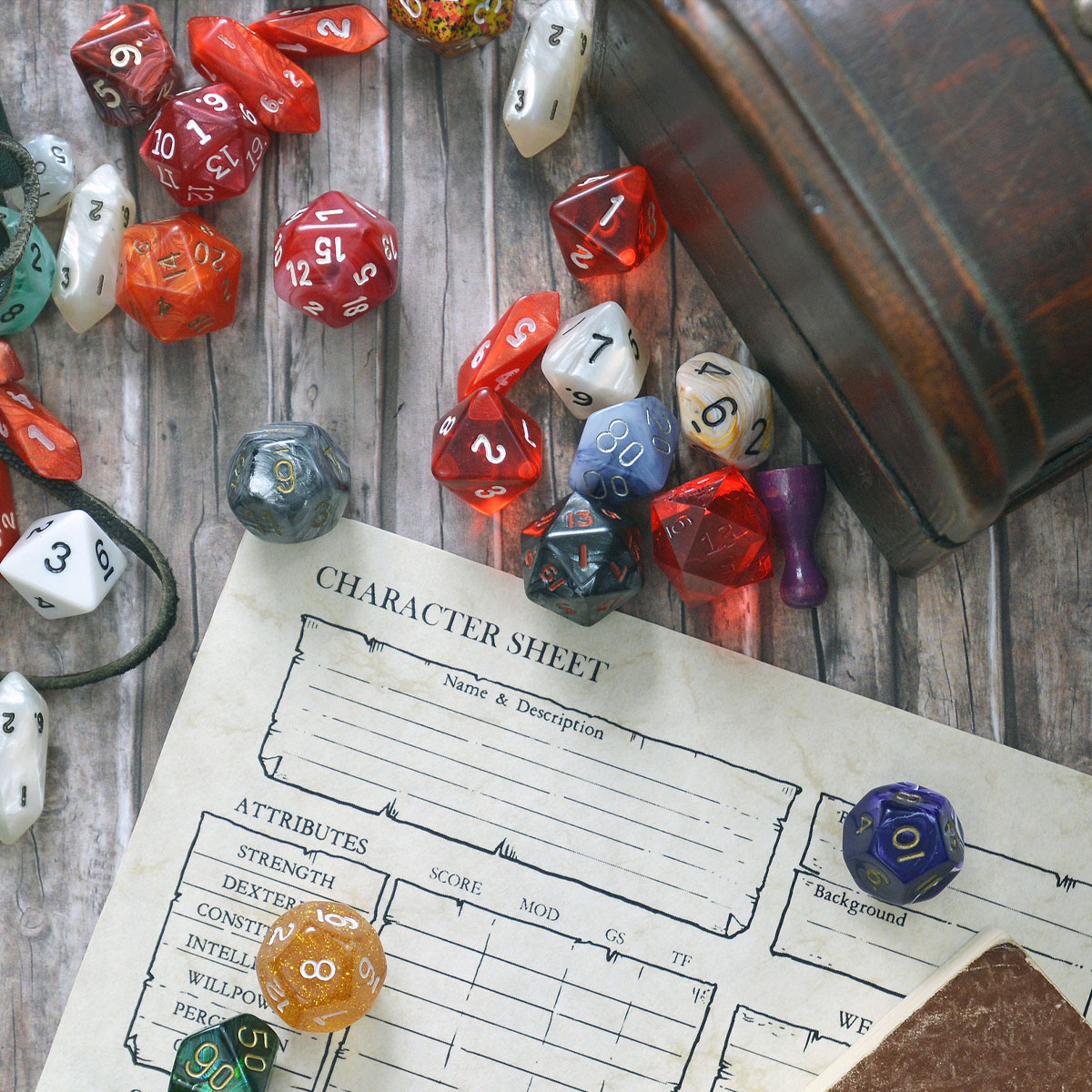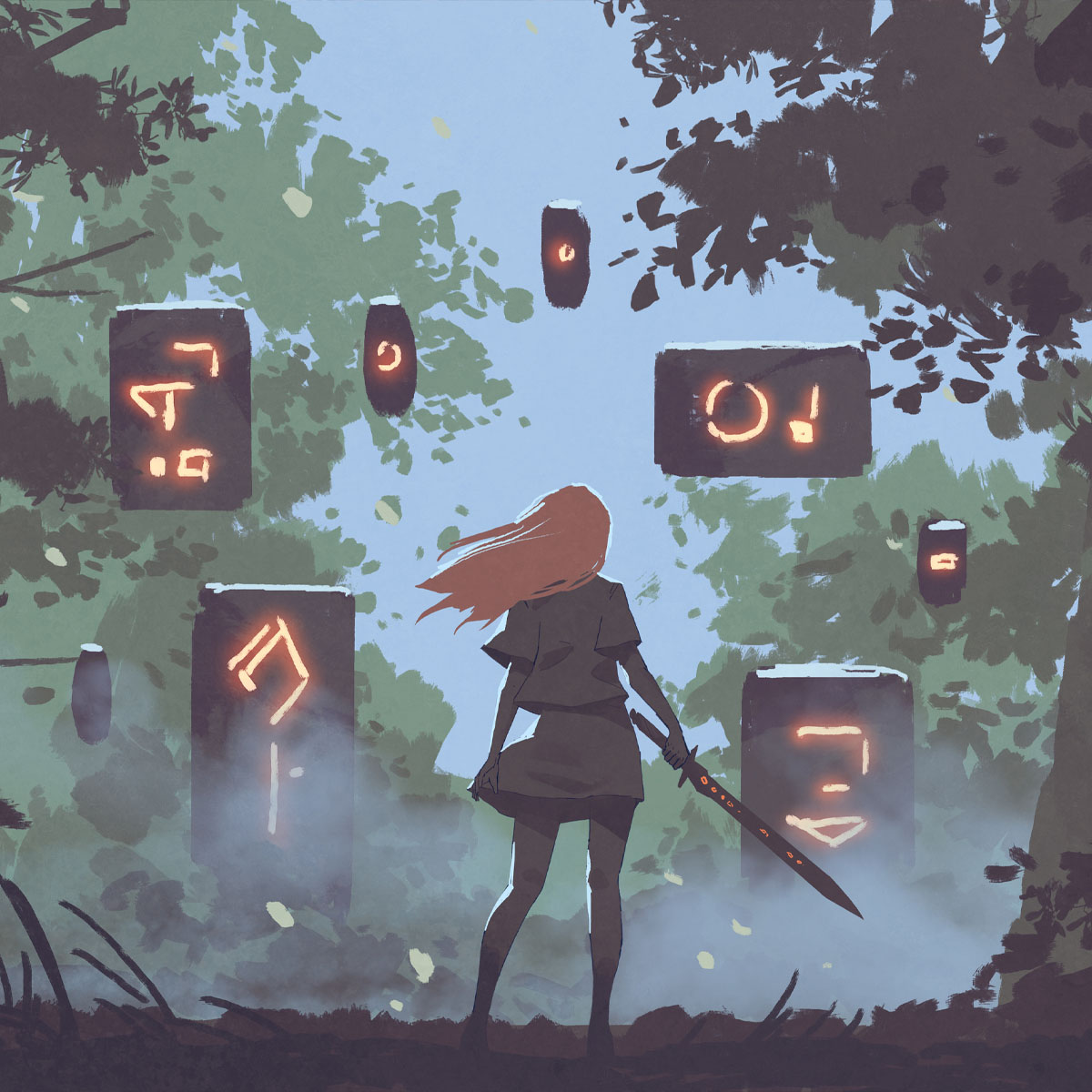
It happens to all of us. You planned a simple encounter to fill some time—challenging, but not intended to be deadly. It was supposed to be filler between story elements, but your players have been rolling terribly all night, and this is your third crit in a row. Your players can’t land a hit to save their lives and are getting slaughtered by this meaningless encounter. This crit is sure to kill several characters; what do you do? Let it stand and watch the party fall, or fudge the roll and give them a chance to escape?
To fudge, or not to fudge, that is the question.
Whether ‘tis nobler to let dice fall as they may,
Chancing party wipes and ruined encounters,
Or to twist the truth in favor of story,
And through a lie, continue.
To play—to wipe, no more.
Ask any game master, and you’ll likely get a different answer on whether fudging dice rolls is good or bad and whether or not they do it. I won’t say that there aren’t GMs who have never fudged a dice roll, but I will say that those who make such claims are either lying or forgetful. I certainly wouldn’t want to play in a game with a GM who refuses to fudge a roll, no matter the circumstance. It suggests that the GM has no real attachment to the story they’re trying to tell or the characters at their table. I believe fudging plays an important role in role-playing games, but there are specific times to do it and other times where the dice should fall as they may.
What is Fudging?
Fudging a dice roll is simply pretending that the die landed on another number, whether better or worse. When game masters fudge dice rolls, it’s usually to make a good die roll worse, though it can be the opposite. When players fudge dice rolls, it’s almost always to make a lousy roll better. At its core, this is cheating. The game rules exist for a reason, and the dice are there to add an element of randomness and chance of failure to the players’ actions. We’re mostly going to talk about game master fudging, but first, let’s talk about players and why they might be fudging their rolls.
Player Fudging
Players shouldn’t be fudging rolls, and when they do, it usually indicates a problem. Most GMs consider this cheating, but I would urge GMs who are facing this issue to try and see if there’s an underlying issue that they can resolve. Players that fudge rolls are generally trying to turn a failure into a success. There are more than a few reasons that players might fudge a roll here and there, but let’s look at a few of the key reasons. Diagnosing these reasons requires taking a look at how the game has been going up until the issue.
Players that fudge rolls are often showing signs of frustration.
If the player has been rolling low all night, a fudged roll is likely a sign of frustration or that the player has stopped having fun. It’s tough for players to accept an entire session of failures. Especially if one player’s consistent failures are bringing down the group, putting pressure on the player to make a good roll. The frustration of another failure may cause them to fudge a roll. Is this wrong? Sure. But it’s also understandable, and if it doesn’t happen often, it’s generally easier just to let it slide. Remember, this game is supposed to be fun for everyone; if it doesn’t hurt the game, where’s the harm?
Sometimes the pressure is just too much. If the group heavily relies on the player’s character (e.g., a sole rogue facing a lot of traps), failed rolls may be particularly damaging. The player probably feels pressured to have successful rolls consistently. In this case, as the game master, you may want to consider reducing the pressure on the player, whether by reducing the number of traps or making healing more available. Depending on the class having the issue, there’s always a way to ease the burden.
If a player generally always rolls well, and you discover that they’ve been fudging rolls, it’s probably worth talking to them. It could be that they feel pressure for their character to perform or get frustrated with consistently low rolls. Sometimes, players just don’t want their character to fail, or their ego won’t let them. That is probably the most problematic issue to deal with, as it’s a player issue, but you can try explaining how some of the more exciting moments in gaming come from unexpected failures.
Game Master Fudging
It is a lot easier for game masters to fudge their rolls, especially if they’re using a GM screen. The dice are hidden, and the players only have the GM’s word as to what that last roll was. Only the game master knows if that crit was actually a crit (unless they show the players), which makes fudging very tempting. We are, after all, telling a story. Why should we not fudge the dice as necessary to tell the story that we want to tell? The answer to that, of course, is that it takes away player agency in the game, and that’s bad. So why do game masters fudge rolls?
Fudging rolls as a game master can take away player agency.
There are generally two reasons that game masters fudge their rolls. The first is guilt, which typically happens when the players have been rolling poorly, and the GM is rolling really well. Every good roll or crit that the GM makes feels worse as the characters get more and more hurt. This is usually when the GM ends up showing rolls to the players to prove that, yes, that fifth crit was, in fact, a crit. Some GMs start fudging rolls to avoid a party wipe if it starts looking bad for the players. That generally falls under acceptable fudging since the GM is fudging rolls to help the players and continue the story.
The second reason game masters fudge rolls is the opposite; because the players are rolling too well, and the GM is rolling poorly. Usually, there is a non-player character the GM doesn’t want to lose, or the players are breezing through an encounter meant to be challenging. In either case, the game master may start fudging rolls to extend the encounter or let their precious NPC slip away. That is generally considered unacceptable fudging. As game masters, we shouldn’t be so attached to the NPCs that we take away from the players’ successes.
The thing about game master fudging is that in most games, it’s not technically cheating. As we often hear in most games, the game master is the final arbiter of the rules, so what they say goes. Some game masters may feel strongly one way or another, but I believe there is a particular time and place for fudging rolls.
When to Fudge Dice Rolls
The whole point of dice rolls in role-playing games is to add a chance of risk and failure. When we remove this chance (by fudging rolls), we remove player agency and diminish their successes and failures. So when should we fudge rolls? My opinion on the matter is relatively simple; when we (as game masters) make a mistake or screw up.
Don’t punish the players for your mistake.
If the players make a poor choice, let them suffer the consequences of good or bad rolls. When players make poor choices, it’s because of their decisions when they have all the facts. That last part is essential. If the game master gives signals that a cave is filled with a very deadly creature, possibly beyond the party’s ability, and they decide to go in anyway, that is a poor player choice. They should suffer the consequences of their actions.
On the other hand, don’t punish the players for the game master’s mistake. Most game masters know when they screwed up, and that is when fudging a few rolls can help fix things and get them back on track. If the game master places an enemy into an encounter that is above the group’s ability to handle it, without indicating that to the players, that is a mistake on the game master’s part. Likewise, if you happen to be rolling exceedingly well and decimating the players, it may be time to let a few rolls fail and let the players shine.
Remember, this is a game, and everyone is there to have fun. It’s not supposed to be you against the players; you’re there to help them tell their hero’s story. Sometimes, the players make bad calls, and their luck runs out. I’m not suggesting you avoid those moments. However, sometimes we make mistakes as GMs and overestimate an encounter or difficulty of a challenge. That is when fudging helps to make minor corrections that, hopefully, the players don’t notice.
You’re there to help them tell their hero’s story.
Fudging Character Deaths
Character death is a touchy topic. Your players are invested in their characters, and losing one is going to be tough. As game masters, we need to make sure those deaths are meaningful and important parts of the overall story. Additionally, we need to make sure that the character’s death comes from their own agency. In other words, that they got themselves into the situation. A meaningless, random death is frustrating to players and makes it feel as though the game master is playing against them.
If an encounter is going poorly, and it looks like characters may die, there are a couple of things to consider. The first is whether or not the players knew what their characters were getting into. If they walked brazenly into a dragon’s den at level one, they’re toast. If they were chasing a kobold and unexpectedly ended up in a dragon’s lair, then you need to offer them a way out. Perhaps the dragon is sleeping and fails its perception check, no matter what. If they leave, everything’s good; if they poke the sleeping dragon, well, now it’s their own decision that drives their deaths.
Let story-related encounters play out however the dice and the players decide.
The second thing to consider is whether or not the encounter even matters. Let it play out if it’s a main story encounter that the players have been working toward. If they are being slaughtered by a random encounter which has no bearing on the story, what would be gained by killing them randomly? A single character death might lead the rest of the party on a quest to revive them, which is fine, so long as they are aware of that option. If not, it’s just killing a character for the sake of the dice and that random chance of failure.
Fudging Without Fudging
Sometimes we make an encounter too hard or too easy, and fudging a dice roll or two isn’t going to make any difference. Fortunately, there are easy ways to correct the situation on the fly while making it seem like that was the plan all along.
If we accidentally made an encounter too hard, and it’s evident that the group is in over their head, the simplest thing to do is have the enemy capture instead of kill. Always remember that the enemy doesn’t have to fight to the death. Even with animal intelligence enemies, they may just fight until one character falls, then drag that character off into the trees for a meal. Let the party regroup and then go after the downed player. This way, you can spread out the enemy or even remove a few before the next fight.
Always remember that combat doesn’t have to be to the death.
If we made an encounter too easy, the simplest solution is to let the party have an easy win. It doesn’t really hurt the game, boosts their confidence, and may even make them a bit complacent before the next fight. That is an excellent option before a challenging battle. If we don’t want to make things easy, it’s simple enough to add any number of patrolling creatures to the ongoing fight. Wait until there’s only a couple of enemies left, then add in another group of the same type of enemy. There’s no setup (you have the stats from the creatures they’re currently fighting), and you already have a good idea of how quickly the enemies fall, so it’s easy to gauge how many more to add. Don’t do this too often, however, or the players will quickly catch on.
If the group is taking out the dungeon boss or big bad evil guy (BBEG) without difficulty, you can undoubtedly add more minions to the fight, or you can just change the BBEG on the fly. Remember, the party has no idea how many hit points, spells, or potions the enemy may have. You can always add more hit points to even out the power level or give the BBEG a potion of full healing, and that can quickly reset the fight or make it last a bit longer. Another option is to take from video game design and add a “second stage” or “final form” to the BBEG. After the party takes them down once, they come back a bit more powerful (through a spell, a magic item, a group of cultists chanting in the next room, etc.). You only want to pull this card once or twice in a campaign at the most since it can feel like the GM punishing the players if done too often.
Conclusion
Once again, role-playing games are meant to be fun for everyone at the table. It’s not us versus them, and, as game masters, we’re not supposed to be trying to kill the players’ characters. Fudging, like anything else, is a tool that can help us make sure the story is ultimately about the heroes’ journey the player characters are on. As long as their failures and successes are consequences of their own choices, let them stand. However, when the game master makes a mistake or misjudges an encounter, there’s nothing wrong with a little fudging or rewriting on the fly to fix the situation.
Want to continue the conversation? Join Our Discord



Commenting has been disabled for this post.